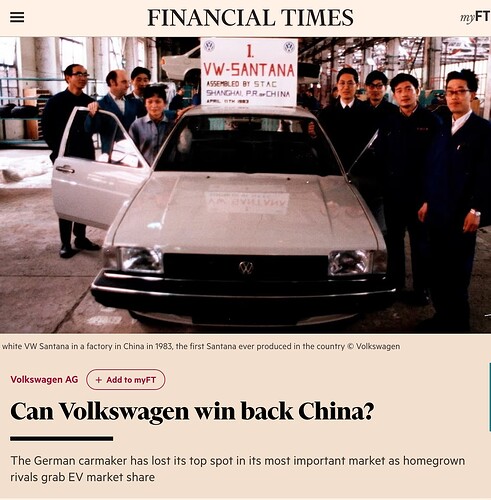-
1978年,一个身着毛泽东服装的中国代表团来到沃尔夫斯堡,向大众汽车公司的负责人传达了一个惊人的信息: 邓小平的中国对商业开放。
-
现在,在从零开始建立世界上最大的汽车市场并从一个经济超级大国的崛起中获利的40年后,这家汽车制造商突然发现自己在中国的地位正在被争夺。
-
虽然这个庞大的德国集团(如今包括保时捷和奥迪)在中国销售的汽车比任何其他公司都多,但其旗舰品牌大众最近被比亚迪夺走了中国最畅销汽车的地位,比亚迪是沃伦-巴菲特支持的深圳企业集团。
-
这家德国公司在快速增长的电动汽车领域落后了,大众汽车品牌在该领域排名第九,市场份额仅为2%。排名第一的比亚迪拥有近40%的市场份额,第二名是埃隆-马斯克的特斯拉,拥有超过10%的份额。
-
中国的电动汽车制造商,包括插电式混合动力和电池驱动的汽车,在他们自己的市场上占主导地位,也在积极向海外扩张。2022年,中国的汽车出口量超过了德国,今年将超过日本,成为世界上最大的汽车出口国。
-
大众汽车是德国最大和最负盛名的公司之一,去年获得220亿欧元的利润,其中至少一半的利润来自中国。
-
大众汽车的高管们并不欣赏他们在中国面临的威胁,因为由于电动车市场份额的争夺,其未来的这些收益的安全性受到了威胁。
-
大众汽车表示,业务质量优先于数量,并报告第一季度在欧洲和北美的销售情况好于预期,但在中国的销售下降了15%。
-
地缘政治问题使大众汽车的前景进一步复杂化,因为德国对习近平主席领导下的中国的经济依赖性感到担忧。
-
大众汽车有可能因回应西方对其最小工厂之一所在地新疆的人权侵犯行为的压力而激怒中国政府。
-
在过去的一年里,大众汽车宣布在中国投资近40亿欧元,并将一名董事会成员调至北京,与其三个主要的合资伙伴进行 “密切合作”。
-
大众汽车的新战略是 “在中国,为中国”,计划在中国进行本地化生产,以抵御供应链的冲击。
-
在上海车展上,大众汽车宣布建立一个10亿欧元的创新中心,对地平线机器人公司投资24亿欧元,并计划将其在中国的工程师人数增加一倍至1200人。
-
行业顾问、分析师和大众汽车前员工对大众汽车的计划持怀疑态度,因为对设计和工程问题的决策停滞不前,而且大众汽车在电动车生产方面已经落后于中国的竞争对手和特斯拉。
-
由于特斯拉承诺在该市建造电动汽车,北京在2018年取消了对汽车制造商外资所有权的限制。
-
分析师表示,大众汽车和其他外国集团害怕打乱其长期的合资伙伴以及它们产生的有利可图的业务。
-
尽管来自政治家、人权活动家和自己的工会的压力,大众汽车已经排除了关闭其在新疆的工厂,因为它必须履行与合作伙伴上汽集团的合同。
-
在今年2月的一份内部备忘录中,大众汽车首席执行官对新疆工厂侵犯人权的报道表示 “深切关注”,但表示该工厂的整体水平很高。
-
中国的电动车公司,如李氏汽车、新鹏汽车和尼奥汽车,正在推动其大众市场的汽车越来越接近自动驾驶功能。
-
大众汽车对中国消费者对技术的关注程度 “掌握得太慢”,导致中国电动汽车制造商提供的服务和功能与大众汽车提供的服务和功能之间存在很大差距。
-
由于中国电动汽车公司的快速发展,大众汽车的中国业务正面临压力。
-
大众汽车害怕打乱他们的合资伙伴和他们创造的有利可图的业务。
-
大众汽车在理解中国消费者对技术的关注方面过于迟缓,导致中国电动汽车制造商提供的服务和功能与大众汽车的服务和功能之间存在差距。
-
In 1978, a Chinese delegation traveled to Wolfsburg to inform Volkswagen that China was open for business.
-
After four decades building the world’s biggest car market, VW has suddenly found itself fighting for its position in China.
-
The VW brand has been dethroned as the country’s best-selling car by BYD, a Shenzhen-based conglomerate backed by Warren Buffett.
-
VW is falling behind in the electric car segment, where it holds a 2% market share compared to BYD’s 40% and Tesla’s 10%.
-
Chinese makers of electric vehicles are dominating in their own market and expanding aggressively overseas.
-
China has overtaken Germany in auto exports and is on track to eclipse Japan as the world’s biggest car exporter this year.
-
The stunning message from the Chinese delegation in 1978 has led to a shift in the global auto market.
-
China is now the world’s biggest car market, and Chinese auto makers are dominating in their own market and expanding aggressively overseas.
-
VW is struggling to keep up with the competition, and its flagship brand has been dethroned as the country’s best-selling car.
-
VW is one of Germany’s largest and most prestigious companies, earning €22bn in profits last year, with at least half of those profits coming from China.
-
VW executives did not appreciate the threat they faced in China, as its future security of those earnings is in jeopardy due to the EV market share race.
-
VW said that quality of business takes precedence over quantity, and reported better than expected sales for the first quarter in Europe and North America, but sales fell 15% in China.
-
Geopolitical issues further complicate the outlook for VW, as Germany is worried about its economic dependence on China under President Xi Jinping.
-
VW risks angering Beijing by responding to western pressure over human rights abuses in Xinjiang, the site of one of its smallest factories.
-
In the past year, VW has announced investments in China worth almost €4bn, and moved a board member to Beijing to work in “close collaboration” with its three main joint venture partners.
-
VW’s new strategy is “in China, for China”, a plan to localise production in the country in order to insulate against supply chain shocks.
-
At the Shanghai auto show, VW announced a €1bn innovation centre, €2.4bn investment in Horizon Robotics, and plans to double its engineers in China to 1,200.
-
Industry consultants, analysts, and former VW staff are sceptical of VW’s plan, as decisions over design and engineering problems are stalled, and VW has fallen behind Chinese rivals and Tesla in EV production.
-
Beijing lifted restrictions on foreign ownership of auto manufacturers in 2018 due to Tesla’s commitment to build EVs in the city.
-
Analysts said that VW and other foreign groups were afraid to upset their longstanding JV partners and the lucrative business they generated.
-
VW has ruled out closing down its factory in Xinjiang, despite pressure from politicians, human rights activists and its own union, as it must honour its contract with partner SAIC.
-
In an internal memo in February, VW’s CEO expressed “deep concern” over reports of human rights violations in the Xinjiang factory, but said that the factory was of a high standard overall.
-
Chinese EV companies such as Li Auto, Xpeng and Nio are pushing their mass-market cars ever closer to autonomous driving functionality.
-
VW has been too “slow to grasp” how technology-focused Chinese consumers have become, resulting in a wide gap between the services and features offered by Chinese EV makers and those available in VW’s cars.
-
VW’s China operations are coming under pressure due to the fast-growing Chinese EV companies.
-
VW is afraid to upset their JV partners and the lucrative business they generate.
-
VW has been too slow to understand how technology-focused Chinese consumers have become, resulting in a gap between the services and features offered by Chinese EV makers and those available in VW’s cars.
1 个赞
大眾的產品力其實在十幾年前就開始走下坡路了,帕薩特和途觀之後,没有一款車能讓人記住。一直在吃老本,很少創新。
这里应该指的是理想汽车,小鹏汽车和蔚来汽车,这三家汽车企业
